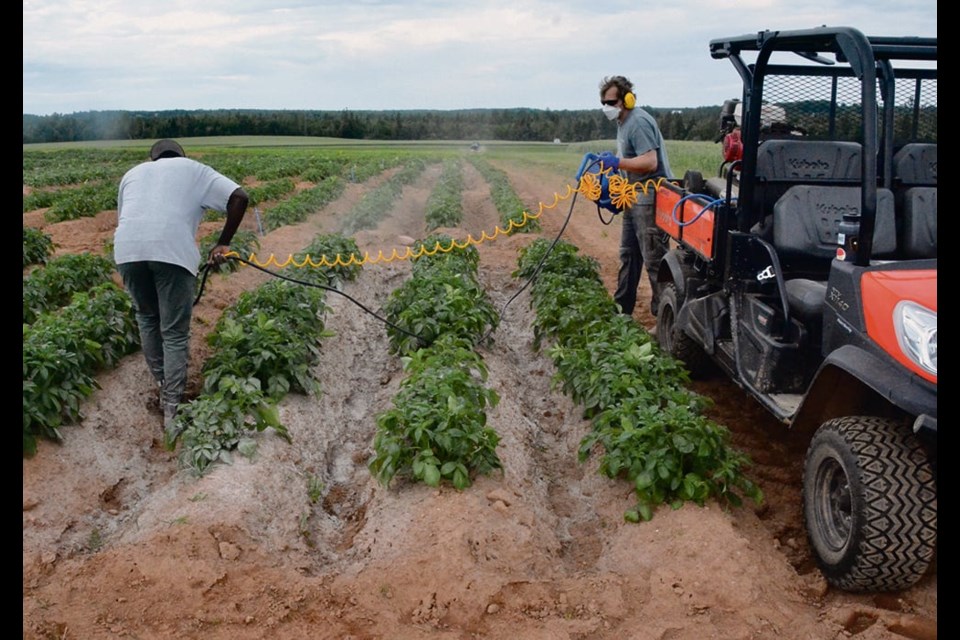WESTERN PRODUCER — Baking soda is the Swiss Army knife of household chemicals.
It can be used as a replacement for toothpaste, to make cookies and cakes fluffier and to remove odours from the fridge.
Andrew McKenzie-Gopsill, an Agriculture Canada scientist in Charlottetown, has discovered yet another use for baking soda — as a weed killer.
This summer, McKenzie-Gopsill and his team applied baking soda to potato plots on Prince Edward Island to test its effectiveness against broadleaf weeds.
“Off the shelf (baking soda), what you buy at the grocery store,” said McKenzie-Gopsill.
“We found really good success with the baking soda, especially on dandelions and lamb’s quarters and small broadleaves…. We applied it in the morning (in July) and by the afternoon those weeds had literally melted.”
However, the scientists didn’t sprinkle baking soda onto the broadleaf weeds. McKenzie-Gospill’s research is part of a larger Agriculture Canada project that is studying abrasive weed management.
Scientists at research centres in British Columbia, Ontario, Quebec and P.E.I. have been blasting weeds with abrasive materials, such as corn grit, walnut grit and baking soda, to see if high-velocity weed control can work in high value crops such as blueberries, dry beans, wine grapes and potatoes.
“Each scientist is equipped with a commercial sandblaster attached to an air compressor to shoot corn grit, walnut shells, in fine and coarse sizes, and a mix of both materials at a rate of 480 kilograms per hectare, amounting to a couple grams per square metre,” says an Agriculture Canada summary of the research.
Robert Nurse, an Agriculture Canada weed scientist in Harrow, Ont., is leading the project. It’s part of a larger Agriculture Canada strategy to reduce herbicide use and provide growers with effective alternatives.
“It’s all about the right timing. We plan to shoot weeds at the same time that farmers might use a herbicide…. It also lines up to when the weeds are just emerging from the soil and are most susceptible,” Nurse said.
Using a sandblaster to kill weeds is a new approach in Canada, but not a novel concept. University of Nebraska scientists have studied abrasive weed control and designed a small sprayer to blast the weeds.
In Prince Edward Island McKenzie-Gopsill and his team used a Kubota that’s equipped with an air compressor and a sandblaster.
They studied several broadleaf weeds that are commonplace in the province, including lamb’s quarters, chickweed and corn spurry.
Prior to 2024, they blasted the weeds with walnut grit or corn grit, which is smashed up walnut shells or corn cobs.
In 2023, a group of P.E.I. potato growers toured the research site to learn about the project. They told McKenzie-Gospill that walnuts are a problem.
It’s an allergen and the growers were worried that a piece of walnut could get stuck in a potato.
“Here (in P.E.I.) we dropped the walnut grit and just focused on corn (grit) and baking soda,” McKenzie-Gopsill said.
The scientists were hoping that corn grit would be effective because it’s an inexpensive material. However, the results were disappointing.
“It does cause some damage. It doesn’t necessarily control most of the (weed) species, but it does knock them back,” McKenzie-Gopsill said.
The baking soda was much more effective, he added.
“Applying it to the tiny little weeds, we think it’s causing enough micro-abrasions on the leaf surface… Then you have that super caustic solution in there. It just melts them.”
Blasting broadleaf weeds with baking soda could kill weeds, but at what cost per acre?
The researchers in Prince Edward Island bought the baking soda in 25 pound bags for $30 per bag.
So, applying 480 kg per hectare (540 lb. per acre) of baking soda per acre would be pricey.
The scientists haven’t done an economic analysis, but abrasive weed control will not be feasible for broad acre crops, McKenzie-Gopsill said.
Nonetheless, if the scientists can figure out the details, it might be useful on high-value, smaller-acreage crops.
One of the key details will be designing a machine or sprayer to blast weeds with baking soda or another abrasive.
“We do have an engineering student working on that … actually building a prototype,” McKenzie-Gopsill said.
“I think they did have a small-scale prototype built last year in St. Jean sur Richelieu.”
Sorting out the technical issues could be difficult, but abrasive weed control does have a huge advantage over traditional herbicides.
Developing and registering a weed killer in Canada can cost hundreds of millions of dollars and may take 10 to 15 years.
“The air-propelled abrasives being tested … would not require registration by Canada’s Pest Management Regulatory Agency,” Agriculture Canada says on its website.
“Without the registration requirement, new projectile materials could be made available to farmers after only two years of small plot testing.”
Related
Outlook for fall seeding looks positive this year
Researchers make a case for protecting field boundaries
Possibly toxic weed found on Manitoba hay fields
Farms can be made pollinator friendly
New tech promises to reduce food waste
Ag Canada’s climate programs found lacking
About the Author
More stories by Robert Arnason




